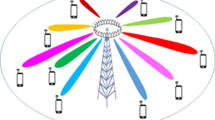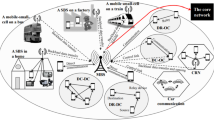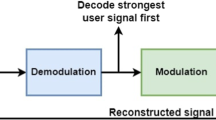Abstract
Resource scheduling in Long Term Evolution (LTE) is an open and rising issue. It has an enormous impact on the entire system performance. Due to the nature of LTE system, the scheduler has to be designed carefully. It has to overcome many challenges such as limited processing time and the high dynamic behavior. This paper proposes a novel scheduling policy for the MAC layer in LTE called the Best Minimum Summation (BMS). The main aim of this scheduling policy is to achieve high performance with low complexity. Three sub-schedulers have been developed. Each one of these schedulers deals with scheduling table in different dimension. The first one operates on the scheduling table through the user dimension (BMS.UE); while the second one operates on the scheduling table through the resource block dimension (BMS.RB). The third scheduler operates on the scheduling table correlating both of these dimensions (BMS.2D). All of the proposed solutions were intensively evaluated in a system level simulator. Three performance metrics were used which are throughput, error rate and fairness. The results have shown that the ability of the BMS.UE scheduler to outperform other existing schedulers of LTE.












Similar content being viewed by others
References
T. G. m. IEEE standard for local and metropolitan area networks—part 16: Air interface for broadband wireless access systems—amendment 3: Advanced air interface. IEEE, Technical report.
T. 36.913. Requirements for further advancements for evolved universal terrestrial radio access (e-utra) (LTE-advanced), 3GPP. Technical Report.
Akyildiz, I. F., Gutierrez-Estevez, D. M., & Reyes, E. C. (2010). The evolution to 4G cellular systems: LTE-advanced. Physical Communication, 3(4), 217–244.
Verizon, LTE. The future of mobile broadband technology. https://www.lte.vzw.com/Portals/95/docs/.
Lee, S.-B., Pefkianakis, I., Meyerson, A., Xu, S., & Lu, S. (2009). Proportional fair frequency-domain packet scheduling for 3GPP LTE uplink. In INFOCOM 2009, IEEE, April 2009, pp. 2611–2615.
Yang, H., Ren, F., Lin, C., & Zhang, J. (2010). Frequency-domain packet scheduling for 3GPP LTE uplink. In INFOCOM, 2010 Proceedings IEEE, March 2010, pp. 1–9.
T. 36.201. Evolved universal terrestrial radio access (e-utra); LTE physical layer; general description, 3GPP. Technical report, 2008.
T. 36.300. Evolved universal terrestrial radio access (e-utra) and evolved universal terrestrial radio access network (e-utran); overall description; stage 2, 3GPP. Technical report, 2008.
Saha, R., & Saengudomlert, P. (2011). Novel resource scheduling for spectral efficiency in LTE-advanced systems with macrocells and femtocells. In: Electrical engineering/electronics, computer, telecommunications and information technology (ECTI-CON), 2011 8th international conference on, May 2011, pp. 340–343.
Xie, T., & Hui, X. (2011). LTE system scheduling algorithm based on utility function. In Communication software and networks (ICCSN), 2011 IEEE 3rd international conference on, May 2011, pp. 370–373.
Kwon, S., & Lee, N.-H. (2011). Uplink qos scheduling for lte system. In Vehicular technology conference (VTC Spring), 2011 IEEE 73rd, May 2011, pp. 1–5.
Shirani-Mehr, H., Papadopoulos, H., Ramprashad, S., & Caire, G. (2011). Joint scheduling and arq for mu-mimo downlink in the presence of inter-cell interference. IEEE Transactions on Communications, 59(2), 578–589.
Jungsup, S., Gye-Tae, G., & Kim, D.-H. (2010). Packet-scheduling algorithm by the ratio of transmit power to the transmission bits in 3GPP LTE downlink. EURASIP Journal on Wireless Communications and Networking, 2010, 6.
Nonchev, S., Valkama, M., & Hamila, R. (2011). Effect of high-velocity scenarios on the performance of mimo lte packet scheduling. In Systems, signals and devices (SSD), 2011 8th international multi-conference on, March 2011, pp. 1–6.
Lima, F. R. M., Wänstedt, S., Cavalcanti, F. R. P., & Freitas, W. C. (2010). Scheduling for improving system capacity in multiservice 3GPP LTE. Journal of Electrical and Computer Engineering, 2010, 3.
Sadiq, B., Madan, R., & Sampath, A. (2009). Downlink scheduling for multiclass traffic in LTE. EURASIP Journal on Wireless Communications and Networking, 2009, 14.
Chung, Y.-L., Jang, L.-J., & Tsai, Z. (2011). An efficient downlink packet scheduling algorithm in lte-advanced systems with carrier aggregation. In Consumer communications and networking conference (CCNC), 2011 IEEE, Jan. 2011, pp. 632–636.
Piro, G., Grieco, L., Boggia, G., Fortuna, R., & Camarda, P. (2011). Two-level downlink scheduling for real-time multimedia services in lte networks. IEEE Transactions on, Multimedia, 13(5), L1052–1065.
Ramli, H., Sandrasegaran, K., Basukala, R., & Afrin, T. (2011). Harq aware scheduling algorithm for the downlink lte system. In Modeling, simulation and applied optimization (ICMSAO), 2011 4th international conference on, April 2011, pp. 1–4.
Yaacoub, E., & Dawy, Z. (2011). Joint uplink scheduling and interference mitigation in multicell lte networks. In Communications (ICC), 2011 IEEE international conference on, June 2011, pp. 1–5.
Kwan, R., & Leung, C. (2011). On collision probabilities in frequency-domain scheduling for lte cellular networks. IEEE, Communications Letters, 15(9), 965–967.
Haataja, T., Pennanen, H., Leinonen, J., Tolli, A., & Latva-aho, M. (2011). Space-frequency scheduling in TDD based LTE-advanced MIMO-OFDMA systems. In Vehicular technology conference (VTC Spring), 2011 IEEE 73rd, May 2011, pp. 1–5.
Ma, Z., Xiang, W., Long, H., & Wang, W. (2011). Proportional fair resource partition for LTE-advanced networks with type I relay nodes. In Communications (ICC), 2011 IEEE international conference on, June 2011, pp. 1–5.
Wang, X., & Konishi, S. (2011). A novel TCP-oriented multi-layer packet scheduling algorithm. In Vehicular technology conference (VTC Spring), 2011 IEEE 73rd, May 2011, pp. 1–5.
Lai, W. K., & Tang, C.-L. (2013). Qos-aware downlink packet scheduling for LTE networks. Computer Networks, 57(7), 1689–1698, 2013. http://www.sciencedirect.com/science/article/pii/S1389128613000352.
Aydin, M. E., Kwan, R., & Wu, J. (2013). Multiuser scheduling on the LTE downlink with meta-heuristic approaches. Physical Communication, 9(0), 257–265, 2013. http://www.sciencedirect.com/science/article/pii/S1874490712000134.
Accongiagioco, G., Andreozzi, M., Migliorini, D., & Stea, G. (2013). Throughput-optimal resource allocation in LTE-advanced with distributed antennas. Computer Networks, 57(18), 3997–4009, 2013. http://www.sciencedirect.com/science/article/pii/S1389128613003496.
Saad, W., Dawy, Z., & Sharafeddine, S. (2012). A utility-based algorithm for joint uplink/downlink scheduling in wireless cellular networks. Journal of Network and Computer Applications, 35(1), 348–356, 2012. http://www.sciencedirect.com/science/article/pii/S1084804511001561.
Zhenqi, S., Haifeng, Y., Xuefen, C., & Hongxia, L. (2013). Research on uplink scheduling algorithm of massive M2M and H2H services in LTE. In Information and communications technologies (IETICT 2013), IET international conference on, 2013, pp. 365–369.
Heulot, J., Boutellier, J., Pelcat, M., Nezan, J.-F., & Aridhi, S. (2013). Applying the adaptive hybrid flow-shop scheduling method to schedule a 3GPP LTE physical layer algorithm onto many-core digital signal processors. In Adaptive hardware and systems (AHS), 2013 NASA/ESA conference on, 2013, pp. 123–129.
Niu, J., Lee, D., Ren, X., Li, G., & Su, T. (2013). Scheduling exploiting frequency and multi-user diversity in lte downlink systems. IEEE Transactions on, Wireless Communications, 12(4), 1843–1849.
Alqahtani, S., & Alhassany, M. (2013). Performance modeling and evaluation of novel scheduling algorithm for LTE networks. In Network computing and applications (NCA), 2013 12th IEEE international symposium on, 2013, pp. 101–105.
Sachan, R., Saxena, N., & Roy, A. (2013). An efficient hybrid scheduling scheme for impatience user in embms over LTE. In Computer communication and informatics (ICCCI), 2013 international conference on, 2013, pp. 1–5.
Ren, F., Xu, Y., Yang, H., Zhang, J., & Lin, C. (2013). Frequency domain packet scheduling with stability analysis for 3GPP LTE uplink. IEEE Transactions on, Mobile Computing, 12(12), 2412–2426.
Abu-Ali, N., Taha, A., Salah, M., & Hassanein, H. (2013). Uplink scheduling in LTE and LTE-advanced: Tutorial, survey and evaluation framework, Communications Surveys Tutorials, IEEE, Vol. PP, no. 99, pp. 1–27, 2013.
Fu, W., Kong, Q., Zhang, Y., & Yan, X. (2013). A resource scheduling algorithm based on carrier weight in LTE-advanced system with carrier aggregation. In Wireless and optical communication conference (WOCC), 2013 22nd, pp. 1–5.
Liu, B., Tian, H., & Xu, L. (2013). An efficient downlink packet scheduling algorithm for real time traffics in LTE systems. In Consumer communications and networking conference (CCNC), 2013 IEEE, pp. 364–369.
Chao, H.-L., Chang, C.-K., & Liu, C.-L. (2013). A novel channel-aware frequency-domain scheduling in LTE uplink. In Wireless communications and networking conference (WCNC), 2013 IEEE, pp. 917–922.
Prasad, N., Zhang, H., Zhu, H., & Rangarajan, S. (2014). Multiuser scheduling in the 3GPP LTE cellular uplink. IEEE Transactions on, Mobile Computing, 13(1), 130–145.
Tung, L.-C., & Gerla, M. (2013). LTE resource scheduling for vehicular safety applications. In Wireless on-demand network systems and services (WONS), 2013 10th annual conference on, pp. 116–118.
Capozzi, F., Piro, G., Grieco, L., Boggia, G., & Camarda, P. (2013). Downlink packet scheduling in lte cellular networks: Key design issues and a survey. Communications Surveys Tutorials, IEEE, 15(2), 678–700.
Xu, Y., Yang, H., Ren, F., Lin, C., & Shen, X. (2013). Frequency domain packet scheduling with mimo for 3GPP LTE downlink. IEEE Transactions on Wireless Communications, 12(4), 1752–1761.
Jang, H.-C., & Hu, C.-P. (2013). Fairness-based adaptive qos scheduling for lTE. In ICT convergence (ICTC), 2013 international conference on, pp. 626–631.
Zou, L., Trestian, R., & Muntean, G.-M. (2013) A utility-based priority scheduling scheme for multimedia delivery over LTE networks. In Broadband multimedia systems and broadcasting (BMSB), 2013 IEEE international symposium on, pp. 1–7.
Niu, J., Lee, D., Su, T., Li, G. Y., & Ren, X. (2013). User classification and scheduling in lte downlink systems with heterogeneous user mobilities. IEEE Transactions on Wireless Communications, 12(12), 6205–6213.
Liao, H.-S., Chen, P.-Y., & Chen, W.-T. (2014). An efficient downlink radio resource allocation with carrier aggregation in LTE-advanced networks. Mobile Computing, IEEE Transactions on, 99, 1–1.
Chen, H., Jiang, Y., Xu, J., & Hu, H. (2013). Energy-efficient coordinated scheduling mechanism for cellular communication systems with multiple component carriers. IEEE Journal on Selected Areas in Communications, 31(5), 959–968.
Holfeld, B., Mochaourab, R., & Wirth, T. (2013) Stable matching for adaptive cross-layer scheduling in the LTE downlink. In Vehicular technology conference (VTC Spring), 2013 IEEE 77th, pp. 1–5.
Sesia, S., Toufik, M. B., & Issam, T. (2009). LTE, the UMTS long term evolution: From theory to practice. Wiley, New York.
Conway, J. H., & Guy, R. (1996). The book of numbers. Springer, Berlin.
Ikuno, J. C., Wrulich, M., & Rupp, M. (2010). System level simulation of LTE networks. In Proceedings of 2010 IEEE 71st vehicular technology conference, Taipei, Taiwan, May 2010.
Rivest, R. L., Cormen, T. H., & Leiserson, C. E. (2001). Introduction to algorithms. McGraw-Hill, New York.
Silberschatz, A., Galvin, P. B., & Gagne, G. (2009). Operating system concepts. Wiley, New York.
Kushner, H., & Whiting, P. (2004). Convergence of proportional-fair sharing algorithms under general conditions. IEEE Transactions on, Wireless Communications, 3(4), 1250–1259.
Jain, D. C. R., & Hawe, W. (1984). A quantitative measure of fairness and discrimination for resource allocation in shared computer system. Digital Equipment Corp., Technical report.
Aydin, M., Kwan, R., Wu, J., & Zhang, J. (2011). Multiuser scheduling on the LTE downlink with simulated annealing. In Vehicular technology conference (VTC Spring), 2011 IEEE 73rd, May 2011, pp. 1–5.
Author information
Authors and Affiliations
Corresponding author
Rights and permissions
About this article
Cite this article
Rafea Ahmed, Z., Subramaniam, S.K., Ahmad Zukarnain, Z. et al. Best Minimum Summation Scheduler for Long Term Evolution. Wireless Pers Commun 77, 2271–2289 (2014). https://doi.org/10.1007/s11277-014-1637-y
Published:
Issue Date:
DOI: https://doi.org/10.1007/s11277-014-1637-y




